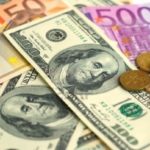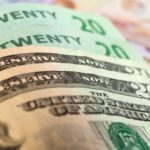Yesterday’s trade saw USD/JPY within the range of 123.54-124.17. The pair closed at 123.97, up 0.06% on a daily basis. The daily low has also been the lowest level since July 15th, when the cross registered a low of 123.23.
At 9:03 GMT today USD/JPY was down 0.13% for the day to trade at 123.81. The pair touched a daily low at 123.68 at 7:40 GMT.
Fundamentals
United States
Initial, Continuing Jobless Claims
The number of people in the United States, who filed for unemployment assistance for the first time during the week ended on July 17th, probably decreased for a second consecutive period, reaching 280 000, according to market expectations, down from 281 000 in the prior week. If so, this would be the lowest number of claims since the week ended on June 19th, when 271 000 claims were reported. The 4-week moving average, an indicator lacking seasonal effects, was 282 500, marking an increase of 3 250 from the previous weeks revised down average.
Initial jobless claims number is a short-term indicator, reflecting lay-offs in the country. In case the number of claims dropped more than projected, this would have a bullish effect on the US dollar.
The number of continuing jobless claims probably rose to the seasonally adjusted 2 225 000 during the week ended on July 10th from 2 215 000 in the prior week. The latter has been the lowest number of continuing jobless claims since the week ended on May 22nd, when 2 196 000 claims were reported. It also represented a decrease by 112 000 compared to the revised down number of claims, reported in the week ended on June 26th. This indicator reflects the actual number of people unemployed and currently receiving unemployment benefits, who filed for unemployment assistance at least two weeks ago.
The Department of Labor is to release the weekly report at 12:30 GMT.
CB Leading Economic Index
The Conference Board Leading Economic Index for the United States probably increased 0.2% in June compared to a month ago, according to the median estimate by experts. In April and May the index rose at a monthly rate of 0.7%, or the sharpest increase since September 2014, when it climbed 0.7% as well.
It encompasses a variety of economic indicators, which signify possible changes in overall economic activity. The index is comprised by the following components: average weekly hours in manufacturing, average weekly initial claims for unemployment insurance, manufacturers’ new orders, consumer goods and materials, ISM Index of New Orders, manufacturers new orders, non-defense capital goods excluding aircraft orders, building permits, new private housing units, Stock prices, 500 common stocks, Leading Credit Index, interest rate spread, 10-year Treasury bonds less federal funds, average consumer expectations for business conditions. Better-than-expected performance of the index is usually dollar positive. The Conference Board will release the official data at 14:00 GMT.
Bond Yield Spread
The yield on Japanese 2-year government bonds went as high as 0.013% on July 22nd, or the exact level as recorded a day ago, after which it slid to 0.005% at the close to lose 0.004 percentage point on a daily basis.
The yield on US 2-year government bonds climbed as high as 0.715% on July 22nd, or the highest level since July 2nd (0.716%), and closed at that same level, gaining 3.3 basis points (0.033 percentage point) for the day.
The spread between 2-year US and 2-year Japanese bond yields, which reflects the flow of funds in a short term, expanded to 0.710% on July 22nd from 0.677% during the prior day. The July 22nd spread has been the most notable one since June 26th, when the difference was 0.712%.
Meanwhile, the yield on Japan’s 10-year government bonds soared as high as 0.432 on July 22nd, or the highest level since July 17th (0.455%), after which it slid to 0.421% at the close to lose 0.006 percentage point compared to July 21st. It has been the fourth consecutive day of yield decrease.
The yield on US 10-year government bonds climbed as high as 2.342% on July 22nd, after which it slipped to 2.327% at the close to lose 0.004 percentage point on a daily basis, while marking a second consecutive day of decrease.
The spread between 10-year US and 10-year Japanese bond yields expanded to 1.906% on July 22nd from 1.904% during the prior day. The July 22nd yield difference has been the largest one since July 15th, when the spread was 1.911%.
Pivot Points
According to Binary Tribune’s daily analysis, the central pivot point for the pair is at 123.89. In case USD/JPY manages to breach the first resistance level at 124.25, it will probably continue up to test 124.52. In case the second key resistance is broken, the pair will probably attempt to advance to 124.88.
If USD/JPY manages to breach the first key support at 123.62, it will probably continue to slide and test 123.26. With this second key support broken, the movement to the downside will probably continue to 122.99.
The mid-Pivot levels for today are as follows: M1 – 123.13, M2 – 123.44, M3 – 123.76, M4 – 124.07, M5 – 124.39, M6 – 124.70.
In weekly terms, the central pivot point is at 123.44. The three key resistance levels are as follows: R1 – 124.87, R2 – 125.67, R3 – 127.10. The three key support levels are: S1 – 122.64, S2 – 121.21, S3 – 120.41.





